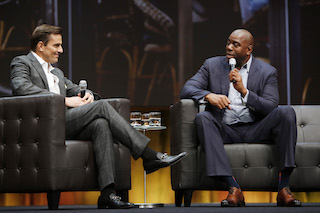Founder of Bregman Partners, Author & Leadership Columnist
Peter Bregman Biography
Peter Bregman is known for his role as CEO of Bregman Partners, Inc., a company dedicated to enhancing leadership within individuals and organizations. His extensive expertise in business, leadership, and personal development has led to significant outcomes such as organizational turnarounds, revenue and stock growth, executive team development, and personal advancement. His contributions include transforming a $30M loss into a $140M gain, increasing revenue from $400M to over $1 billion, and aiding numerous executives in achieving C-level promotions and substantial stock price growth.
Bregman is highly regarded in the field of executive coaching, ranked as the #1 executive coach globally. He works with C-Level executives across a spectrum of industries and notable organizations such as Allianz, Twilio, Electronic Arts, and Mars. He has been acknowledged by Thinkers 50 Radar as a Top 30 thought leader and selected among the Top 8 thought leaders in leadership. His recognition extends to being named among the top 30 best Coaches and leadership speakers/trainers worldwide by Global Gurus.
As an author, Bregman has contributed significantly to leadership literature. His notable works include "You CAN Change Other People: The Four Steps to Help Your Colleagues, Employees—Even Family—Up Their Game" and "Leading with Emotional Courage: How to Have Hard Conversations, Create Accountability, and Inspire Action on Your Most Important Work." His book "18 Minutes: Find Your Focus, Master Distraction, and Get the Right Things Done" received accolades as a Wall Street Journal bestseller, an Axiom Business Book awards Gold medal winner, and was recognized by NPR as the best business book of the year. Additionally, "Four Seconds: All the Time You Need to Replace Counter-Productive Habits with Ones That Really Work" was highlighted as a top pick by the New York Post in 2015.
Bregman also developed the #1 Leadership Development Program globally, a transformative four-day initiative that enhances participants' confidence, connection, commitment, and emotional courage. He designed the Big Arrow process, which aligns teams to execute their organization’s crucial work, and introduced the Big Arrow Measurement tool to identify gaps in leadership and organizational execution.
In addition to his achievements, Bregman hosts the Bregman Leadership Podcast, a top 10 Business Podcast with over 1.5 million downloads. He is also a frequent contributor to the Harvard Business Review, with his insights appearing in media outlets such as BusinessWeek, Fast Company, Psychology Today, Forbes, PBS, ABC, CNN, NPR, and FOX Business News.
Bregman earned his B.A. from Princeton University and his M.B.A. from Columbia University, grounding his practical knowledge in a robust educational foundation.
Contact a speaker booking agent to check availability on Peter Bregman and other top speakers and celebrities.
Peter Bregman Speaking Topics
-
You CAN Change Other People: The Four Steps to Help Your Employees, Colleagues – Even Family – Up Their Game
“You can’t change other people. You can only change yourself.” It’s a truism. Only it’s not true.
In fact, if you’re a leader or a manager in an organization – if you’re a coach – you have to change other people. It’s your job. If you’re a parent, it’s your job too. And if you care about the people in your life who aren’t reaching their potential or, worse, are acting in self-destructive ways, it’s your longing.
The problem isn’t that you can’t change other people, the problem is that the things you do and say to try to change them don’t work because you’re doing and saying the wrong things. In fact, most likely you’re having the opposite effect.
What does work? That’s the focus of this session. We’ll look at the 4 fundamentals that need to exist for people to make sustainable change, and we’ll share the Four Steps – the straightforward, methodical, and replicable process for reliably helping other people change.
Key Takeaways:
- Understand why it’s been so difficult to help other people change – and what we typically do that makes it even harder.
- Identify the 4 powers people need to make sustainable change.
- Learn the Four Steps – the straightforward and replicable process for reliably helping other people change.
-
Leading with Emotional Courage
Based on his book Leading with Emotional Courage: How to Have Hard Conversations, Create Accountability, and Inspire Action on Your Most Important Work, bestselling author Peter Bregman unlocks the secrets of highly successful leaders – no matter their role or level in the hierarchy – and pinpoints the missing ingredient that makes all the difference: emotional courage.
Emotional courage distinguishes powerful leaders from weak ones. It means speaking up when others are silent and remaining steadfast, grounded and measured in the face of uncertainty. It means responding productively to political opposition—maybe even bad-faith backstabbing—without getting sidetracked, distracted or losing your focus.
In this engaging and interactive talk, Peter shows audiences:
- Why emotional courage is important, and examples of its power
- Why the best leaders have confidence in themselves, the ability to connect with others, and commitment to a purpose – and how emotional courage is the key to unlocking all of those factors
- What it feels like—experientially through fun and effective exercises—to have emotional courage
- How to use emotional courage to initiate hard conversations, create accountability, and inspire focused action on your most important work.
- This speech is a guide for becoming a great leader. A leader who has the power to speak with courage to align teams, inspire action, and achieve stellar results.
Peter Bregman Videos
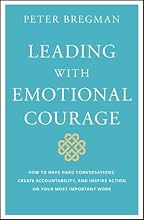
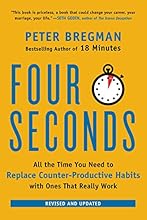
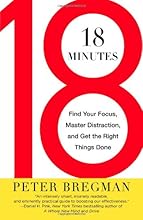
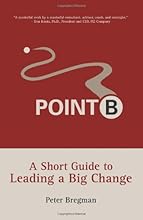
-
How do I book Peter Bregman to speak at my event?
Our experienced booking agents have successfully helped clients around the world secure speakers like Peter Bregman for speaking engagements, personal appearances, product endorsements, or corporate entertainment since 2002. Click the Check Availability button above and complete the form on this page to check availability for Peter Bregman, or call our office at 1.800.698.2536 to discuss your upcoming event. One of our experienced agents will be happy to help you get speaking fee information and check availability for Peter Bregman or any other speaker of your choice. -
What are the speaker fees for Peter Bregman
Speaking fees for Peter Bregman, or any other speakers and celebrities, are determined based on a number of factors and may change without notice. The estimated fees to book Peter Bregman are $50,000 - $100,000 for live events and $30,000 - $50,000 for virtual events. For the most current speaking fee to hire Peter Bregman, click the Check Availability button above and complete the form on this page, or call our office at 1.800.698.2536 to speak directly with an experienced booking agent. -
What topics does Peter Bregman speak about?
Peter Bregman is a keynote speaker and industry expert whose speaking topics include Author, Business, Business Leadership, Change Management, Communication, Corporate Culture, Entrepreneurship, Human Resources, Leadership, Marketing, Motivational, Non-Fiction Authors, Peak Performance, Personal Growth, Sales, Teamwork & Teambuilding, Technology -
Where does Peter Bregman travel from?
Peter Bregman generally travels from New York, NY, USA, but can be booked for private corporate events, personal appearances, keynote speeches, or other performances. For more details, please contact an AAE Booking agent. -
Who is Peter Bregman’s agent?
AAE Speakers Bureau has successfully booked keynote speakers like Peter Bregman for clients worldwide since 2002. As a full-service speaker booking agency, we have access to virtually any speaker or celebrity in the world. Our agents are happy and able to submit an offer to the speaker or celebrity of your choice, letting you benefit from our reputation and long-standing relationships in the industry. Please click the Check Availability button above and complete the form on this page including the details of your event, or call our office at 1.800.698.2536, and one of our agents will assist you to book Peter Bregman for your next private or corporate function. -
What is a full-service speaker booking agency?
AAE Speakers Bureau is a full-service speaker booking agency, meaning we can completely manage the speaker’s or celebrity’s engagement with your organization from the time of booking your speaker through the event’s completion. We provide all of the services you need to host Peter Bregman or any other speaker of your choice, including offer negotiation, contractual assistance, accounting and billing, and event speaker travel and logistics services. When you book a speaker with us, we manage the process of hosting a speaker for you as an extension of your team. Our goal is to give our clients peace of mind and a best-in-class service experience when booking a speaker with us. -
Why is AAE Speakers Bureau different from other booking agencies?
If you’re looking for the best, unbiased speaker recommendations, paired with a top-notch customer service experience, you’re in the right place. At AAE Speakers Bureau, we exclusively represent the interests of our clients - professional organizations, companies, universities, and associations. We intentionally do not represent the speakers we feature or book. That is so we can present our clients with the broadest and best performing set of speaker options in the market today, and we can make these recommendations without any obligation to promote a specific speaker over another. This is why when our agents suggest a speaker for your event, you can be assured that they are of the highest quality with a history of proven success with our other clients.
Peter Bregman is a keynote speaker and industry expert who speaks on a wide range of topics such as You CAN Change Other People: The Four Steps to Help Your Employees, Colleagues – Even Family – Up Their Game, Leading with Emotional Courage, 18 Minutes: Find Your Focus, Master Distraction, and Get the Right Things Done and Managing Change without Resistance. The estimated speaking fee range to book Peter Bregman for your event is $50,000 - $100,000. Peter Bregman generally travels from New York, NY, USA and can be booked for (private) corporate events, personal appearances, keynote speeches, or other performances. Similar motivational celebrity speakers are Joseph Grenny, Ryan Estis, Mike Abrashoff, Shawn Achor and Peter Sheahan. Contact All American Speakers for ratings, reviews, videos and information on scheduling Peter Bregman for an upcoming live or virtual event.
This website is a resource for event professionals and strives to provide the most comprehensive catalog of thought leaders and industry experts to consider for speaking engagements. A listing or profile on this website does not imply an agency affiliation or endorsement by the talent.
All American Entertainment (AAE) exclusively represents the interests of talent buyers, and does not claim to be the agency or management for any speaker or artist on this site. AAE is a talent booking agency for paid events only. We do not handle requests for donation of time or media requests for interviews, and cannot provide celebrity contact information.
If you are the talent and wish to request a profile update or removal from our online directory, please submit a profile request form.




